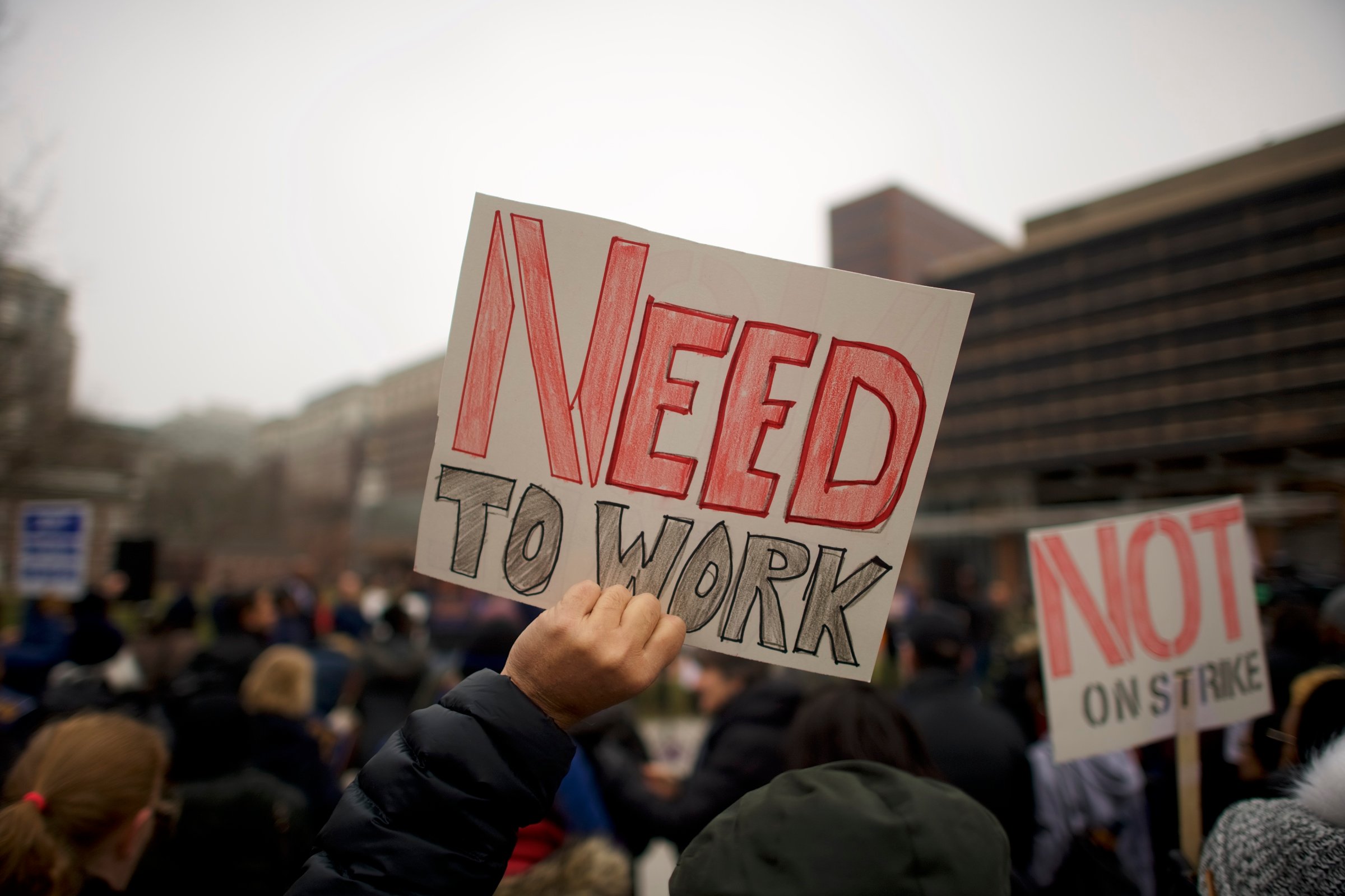
On Friday, President Donald Trump and congressional leaders reached a deal to reopen the government after the longest shutdown in American history. While most furloughed federal workers will receive back pay, those contracted by the government will not, and they aren’t happy about it.
Sunny Blaylock, a government contractor for the U.S. State Department, tells TIME she is frustrated and feels like nothing is being done to help contractors. She said she will not receive back pay for the work that she missed during the 35 days in which the government was shutdown.
“I feel like a second class citizen now more than ever,” she said. “No one cares about contractors.”
While 800,000 federal workers have been affected by the partial shutdown, the Washington Post has estimated that there are 10,000 companies who have contracts with the government. The number of employees who are contracted to work through these companies for the government and affected by the shutdown remains unclear.
Taylor Gautreaux, a government contractor for a private company, says because of the shutdown she’s been forced to borrow 80 hours of paid time off from her company. She said that workers were encouraged to do so over the shutdown. Gautreaux, who is expecting a baby in March, said she now essentially owes that time to her employer, which forces her to accrue paid time off to bring her back to 0 hours.
“It’s not fair to contractors to have to go without pay for the duration of the shutdown and then have to go back to work and basically be indebted to our companies,” she tells TIME.
“I’m trying to remain positive and just remember that at least I will receive one more full paycheck once I’m allowed to work again,” she added. “Every little bit counts right now.”
Others have had to accept assistance from helping hands to get through the shutdown.
Sixty-year-old Faye Smith is a furloughed contract security guard at the Smithsonian’s Hirshorn Art Museum who protested the shutdown at the Hart Senate Office Building in Washington D.C. on Wednesday. She was among hundreds of furloughed federal workers and contractors demanding the government reopen. Smith got national attention when she shared her story with local reporters at the protest, revealing she was afraid she would miss her rent payment and end up homeless.
Josh Tjaden saw Smith’s story on social media and decided to start a GoFundMe campaign in her name.
“I want to pay Faye’s rent. How do we contact her? I can’t watch a grown grandma cry,” Tjaden tweeted.
Tjaden started the “Faye Smith Rent Fund” on Wednesday and as of Saturday has raised over $11,000, more than double the initial $5,000 goal.
On Saturday, Smith told TIME that she is thankful for the fundraiser, but still unsure about back pay. She is set to return to work on Monday, where she said she will ask about it.
“Right now I’m still struggling a little bit and I’m in debt because of back pay and I’m trying to catch up with utilities,” Smith said. “I have a family of five, so I’ve stretched [the funds] a little bit because I didn’t only want it to be about me.”
Smith said she used the funds to help her and her sister, who is also a furloughed worker.
In an attempt to support contract workers, a group of congressional and senate leaders have announced support for the Fair Compensation for Low-Wage Contractor Employees Act.
The bill aims to provide up to $600 per paycheck in back pay for furloughed federal contracted employees, including janitorial, food and security workers. It has the support of Democrats in the House and Senate, including Hawaiian Sen. Mazie Hirono and Massachusetts Rep. Joe Kennedy III.
“Janitors, security guards, food service employees and millions of other contract workers who keep our government functioning will not be reimbursed for paychecks missed during this shutdown. Every single one of them should receive back pay. Period,” Kennedy tweeted Friday.
The Department of Labor, Office of Management and Budget and congressional leaders did not immediately respond to a request for comment on the possibility of back pay for government contracted workers.
The funding passed by Congress and signed by Trump only keeps the government open for three weeks while the President said he expected negotiations to continue for his proposed border wall.
“If we don’t get a fair deal from Congress, the government will either shut down on Feb. 15, again, or I will use the powers afforded to me under the laws and Constitution of the United States to address this emergency,” Trump said in a speech at the Rose Garden on Friday.
Additional reporting by Mahita Gajanan.
More Must-Reads From TIME
- The 100 Most Influential People of 2024
- The Revolution of Yulia Navalnaya
- 6 Compliments That Land Every Time
- Stop Looking for Your Forever Home
- If You're Dating Right Now , You're Brave: Column
- The AI That Could Heal a Divided Internet
- Fallout Is a Brilliant Model for the Future of Video Game Adaptations
- Want Weekly Recs on What to Watch, Read, and More? Sign Up for Worth Your Time
Write to Gina Martinez at gina.martinez@time.com